syria
1. I Went to Church with Bruce Jenner, and Here’s What Caitlyn Taught Me About Jesus
“Caitlyn knows who Jesus is, and Jesus knows her by name. Whether that sits comfortably on a timeline or blog comment, I know firsthand that Caitlyn has heard the good news. And, Caitlyn has taught me more about Jesus.”
2. And the Award for Trailblazing Feminist Icon Goes to — Miss Piggy
The Sackler Center for Feminist Art awarded the Muppet with its First Award, which recognizes women for being first in their fields and has included the likes of Sandra Day O’Connor, because the character has “qualities that … women need to have to face the world as it is, and she gives us a good smile on top of it all.”
3. In Baltimore Schools, Free Meals for All
"Given the socio-economic status of the city, it's a no-brainer," [parent David T.] Clements said of the program. "Parents can now take that money and apply it to their futures."
4. Study Finds Global Warming Hasn’t Slowed
The latest study, published in Science, reverses previously held thought that global warming was on hiatus. Not so, according to the numbers, which were based on what the scientists say is more accurate land and sea temperature measurements.
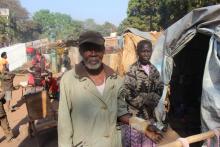
Despite much gloom and doom, there were a few silver linings in the report. Religious freedom and harmony have improved in Cyprus, resulting in greater access to houses of worship across the Green Line separating north from south. Nigeria witnessed its first peaceful democratic transfer of power earlier this year when Muslim northerner Muhammadu Buhari ousted Christian southerner Jonathan Goodluck at the polls. And Sri Lanka’s new government has taken positive steps to promote religious freedom and unity in the face of violent Buddhist nationalism.

Just a few decades ago, Aleppo was home to about 170,000 Catholics, about a third of the city’s population. Since the war broke out, Jeanbart has seen a third of his flock reduced by death, dislocation, and emigration while Aleppo’s Muslim population has soared.
The threat of annihilation is constant, as Aleppo has become the main battleground between the government forces of President Bashar Assad and a motley assortment of rebels who include growing numbers of fighters affiliated with the fundamentalist terrorism of the Islamic State group.
1. An Open Letter to Franklin Graham
"Within one day, tens of thousands of [Graham’s] faithful followers liked and shared his short, patronizing post that called ‘Blacks, Whites, Latinos, and everybody else’ to ‘Listen up’ and tune in to his take on why so many black people have died at the hands of police officers recently. According to Graham, the problem is “simple.” It can be reduced to their lack of obedience and bad parenting. … Thankfully, we have a response: We invite you to join with us in signing on to an open letter to Rev. Graham calling him back to the Gospel's ministry of reconciliation. Sign on now."
2. PHOTOS: The First Day of Spring and a Total Lunar Eclipse
Space.com offers this gallery of images from this early morning’s lunar eclipse (not visible from the United States). In addition to coinciding with the vernal equinox — kicking off Spring, as snow fell across the Northeast — the eclipse also overlapped with the supermoon. ...And astronomers across the world geeked out.
3. Ashley Judd Pressing Charges Against Misogynist Internet Trolls
“Everyone needs to take personal responsibility for what they write, and [for] not allowing this misinterpretation and shaming culture on social media to persist,” Judd said. “And by the way, I’m pressing charges.”
4. This Is What Life in Syria Is Like After Four Years of War
According to the U.N., 200,000 people have been killed. More than half of the country’s 21 million residents have fled their homes. Life expectancy has fallen by 20 years. It has becomes the world’s deadliest country for reporters. BuzzFeed interviews three Syrians to get a feel for life in the war-torn country.
From The Atlantic: “Mennonites are wrestling with the same questions faced by other churches across the country, made all the more complicated by their heritage: How should the faithful balance tradition and modern life? How should scripture inform people's understandings of same-sex relationships? And when members of a denomination disagree, how should they find their way forward?”
6. Pentagon Loses Track of $500 Million in Weapons, Equipment Given to Yemen
“In recent weeks, members of Congress have held closed-door meetings with U.S. military officials to press for an accounting of the arms and equipment. Pentagon officials have said that they have little information to go on and that there is little they can do at this point to prevent the weapons and gear from falling into the wrong hands.”
7. You May Be a ‘Poser’ Christian and Not Even Know It
According to Jarrid Wilson, author of Jesus Swagger: Break Free from Poser Christianity, cosmetic Christianity is an epidemic. Jonathan Merritt interviews the author to find out more.
8. U.N. Workers Accused in Nearly 80 Cases of Sexual Assault in 2014
“United Nations personnel were accused in nearly 80 cases of rape, sexual assault and sex trafficking in 2014 alone, with the bulk of the cases involving peacekeepers deployed to some of the most troubled parts of the world.”
9. Where My Ladies At? Gender Avenger Tracks Inequality at SXSW and Beyond
Wondering whether your favorite conference or event has its equal share of men and women at the podium? There’s an app for that. The Gender Avenger Tally (soon available on mobile) lets people calculate via event hashtag the levels of gender representation.
10. Happy Spring! Read Walt Whitman’s ‘The First Dandelion’
Simple and fresh and fair from winter’s close emerging,
As if no artifice of fashion, business, politics, had ever been,
Forth from its sunny nook of shelter’d grass — innocent, golden, calm as the dawn,
The spring’s first dandelion shows its trustful face.
The destruction and looting of art and historical sites in Syria is "the worst cultural disaster since the Second World War,” according to anthropologist Brian L. Daniels.
The human losses are devastating: At least 210,000 people have died in the ongoing battle between the Assad regime and the Syrian rebels. ISIS has joined the violence and exploited the instability in the country, taking control of large parts of northern and eastern Syria.
And now, in the unofficial war over Syria’s cultural heritage, art is the main casualty. As of September 2014, five out of six of Syria’s Word Heritage sites had been destroyed including Aleppo’s 12th century Umayyad mosque.
ISIS’ ruthless participation in the Syrian conflict only increases the danger to Syrian art and history: In ISIS controlled Mosul, Iraq, art, music, and history have been removed from school curriculum. In February, ISIS released a video of its fighters smashing ancient statues and artifacts in the Mosul museum in an effort to weed out “heresy,” prompting the UNESCO Director-General to call for an emergency meeting with the Security Council to advocate for the “protection of Iraq’s cultural heritage as an integral element for the country’s security.”
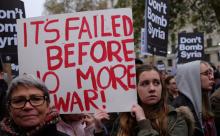
THE PEACE MOVEMENT needs a stronger response to the threat posed by the Islamic State in Iraq and Syria. It is not enough merely to oppose deepening U.S. military involvement. We must also identify viable diplomatic and political options for countering the ISIS danger and reducing violence in the region.
President Obama has said there is no military solution to the crisis in Iraq, but his administration has relied heavily on bombing as its main response to ISIS. Since August, the United States and about a dozen other states have launched more than 1,900 air strikes against ISIS and militant groups in Iraq and Syria. Approximately 80 percent of the strikes have been conducted by U.S. forces, mostly jet fighters but also armed drones. The strikes have had the effect of halting further ISIS encroachments into Iraq and have enabled Kurdish fighters to regain some ground in the northern part of Iraq. In Syria, however, ISIS reportedly has continued to gain ground despite the U.S.-led attacks.
U.S. military involvement in Iraq and Syria is having unintended effects that could make matters worse. Battling the United States gives ISIS a transcendent objective beyond its political agenda in Iraq and Syria and distracts local attention from its brutal policies. It allows ISIS to portray itself as the victim and to claim that it is defending Islam from Western attack. After the start of airstrikes in August, support for the group increased. The strikes in Syria have also targeted the al Nusra Front and have generated pressure for rival groups to close ranks. Unlike al Qaeda, ISIS has not declared war on the United States, but it may now rethink its strategic focus and plan attacks on the “far enemy,” to use al Qaeda’s term.
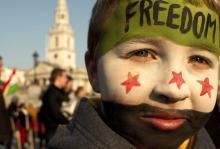
IN JULY 2013 in Raqqa, the first city liberated from regime control in northeastern Syria, a Muslim schoolteacher named Soaad Nofal marched daily to ISIS headquarters. She carried a cardboard sign with messages challenging the behaviors of members of the Islamic State of Iraq and Syria as un-Islamic after the kidnapping of nonviolent activists. After Nofal was joined by hundreds of other protesters, a small number of activists were released. It is a small achievement, but an indication of what communities supported in responsible ways from the outside could achieve on a larger scale in areas controlled or threatened by ISIS.
In the fight against ISIS, unarmed civilians would seem to be powerless. How can collective nonviolent action stand a chance against a heavily armed, well-financed, and highly organized extremist group that engages in public beheadings, kidnappings, and forced recruitment of child soldiers and sex slaves? One whose ideology sanctions the killing of “infidels” and the creation of a caliphate?

With the unimaginable evils being committed by ISIS and other terror groups around the world, many Christians are calling for their violent destruction — some even voluntarily taking up arms.
At first glance this may seem like a heroic, brave, and honorable act, but before we start killing our enemies, Christians must ask themselves four very important questions:
1. Did Jesus clearly tell you to kill these people?
In the New Testament, Jesus repeatedly instructs his followers to avoid violence and promote peace.
Jesus states things like:
Blessed are the peacemakers, for they shall be called sons of God. (Matt. 5:9 ESV)
And …
You have heard that it was said, ‘An eye for an eye and a tooth for a tooth.’ But I say to you, Do not resist the one who is evil. But if anyone slaps you on the right cheek, turn to him the other also. (Matt. 5:38-39)
And …
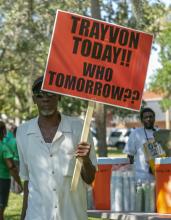
WE HAVE AMPLE reason to weep of late: war in Gaza, crisis in Syria, ISIS in Iraq, the slaying of five unarmed black men in one month at the hands of U.S. police officers, and the demise of congressional immigration reform.
Scripture calls us to cross over into the valley of lament at times such as these. Yet most of us are more comfortable on the plateau of rage or the plain of apathy.
I once led a training on lament and racial reconciliation. Twenty college students sat in the living room of a ministry house as I recited a lament from Jeremiah, the “weeping prophet”: “O that my head were a spring of water, and my eyes a fountain of tears, so that I might weep day and night for the slain of my poor people!” (9:1).
I spoke of the impact of racial injustice in our nation and on our campuses. I recounted slave narratives to the students—stories that had brought me to tears privately. Yet, when the last word was read, the students sat silent with glazed eyes staring back at me.
I didn’t get it. The whippings of human beings, the children separated from their mothers and fathers, the hands, feet, and lives lost in the midst of America’s darkest hours—these things happened. How could we not lament?
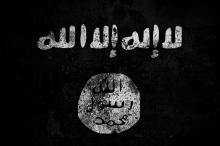
Whether ISIS is "Islamic," or a "state," it is definitely terrifying. As it terrorizes the Levant — killing Muslims, Christians, Jews, Yazidis, and other religious/cultural minorities in Syria and Iraq — and takes the lives of Western journalists, it strikes fear in the hearts of many.
Swirling around the alarming analysis are the rumors and realities of individuals from Europe and the U.S. joining the ranks of ISIS and fighting for their "cause."
The intelligence organization Soufan Group recently released a report stating that fighters from at least 81 countries have traveled to Syria since its three-year conflict began. Hundreds of recruits come from nations like France, Germany, the UK, and the U.S.
Of all the fearful intimations of this conflict, this feature seems to be the most frightening to many in the West. Could it be that my neighbor is a secret jihadi? Are redheads (a "pure" European stock) more prone to terrorism? Are mosques their hideouts? Regardless of the judiciousness of these questions, underlying them all is the question "why?" Why would someone leave the West to fight for ISIS in Syria and Iraq?
According to the Soufan report, those that leave for the Middle East to fight are typically 18-29 year-old men (some as young as 15) and some Western women who join with their spouses, or come alone to become "jihadi brides." These men and women are Islamic, often second or third generation immigrants, though very few have prior connections with Syria.
Why do they join? Is it religious devotion? Psychological imbalance? Tendency toward radical movements and anarchy? All of these motivations may play a part, but my argument is that these men and women who leave their Western homes for the dunes of terror are lonely.
These Western jihadis are isolated — that is why they join ISIS.
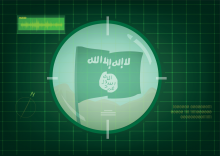
Here at Sojourners we have written a lot about nonviolence. We take seriously the words of Jesus that we should love our enemies and pray for those who persecute us. We believe that violence begets violence, or as Jesus put it, “Those who live by the sword die by the sword.” Personally, I take seriously the words of René Girard, the founder of mimetic theory, that we are now “confronted with a perfectly straightforward and even scientifically calculable choice between total destruction and the total renunciation of violence.”
Many Christians look to the Bible to justify divinely sanctioned violence against our enemies. Excuse me for stating the obvious, but Christians are not Biblians. We are Christians. As Christians, we should be putting Jesus first. Not Deuteronomy. Not Joshua. Not Judges. Not David. Not Solomon. Not Peter. Not Paul. Not the Bible.
Jesus first.
And Jesus calls us to nonviolence. As one of the early Christians stated, the way of Jesus, the way of nonviolent love that embraces our enemies, is the way of the cross and the world thinks that way is foolish.
We proclaim Christ crucified, a stumbling block to the Jews and foolishness to the Gentiles, but to those who are the called, both Jews and Greeks, Christ the power of God and the wisdom of God. For God’s foolishness is wiser than human wisdom, and God’s weakness is stronger than human strength.

That was a bumper sticker Sojourners published at the outset of the Iraq war more than a decade ago. American church leaders had not only opposed the war but offered an alternative: "An Alternative to War for Defeating Saddam Hussein, A Religious Initiative." We not only presented it to Colin Powell’s personal council and Tony Blair, but also printed full-page ads in every major British newspaper the day before their Parliamentary debate and vote on the war. The U.K.’s Secretary of State for International Affairs, Clair Short, told me the only real alternative on the table in their Cabinet meetings was “The American church leaders’ plan,” which, she said, was seriously discussed. U.S. and U.K. leaders showed they were drawn to an alternative plan to war that would remove any weapons of mass destruction that Saddam Hussein might have had (which he did not) and even to ultimately remove him from power but without going to war. Pope John Paul II was also opposed to the potential war. Both the Vatican and the American church leaders warned that the potential costs of a war in Iraq could include increasing the scope and threats of international terrorism. ISIS is that sad prophecy come true; the habit of war prevailed.
I have always believed that any alternative to war must still address the very real problems at hand — just in a more effective way. To say that “war is not the answer” is not only a moral statement but also is a serious critique of what doesn’t work; wars often fail to solve the problems and ultimately make them worse. War has to answer to metrics, just as more peaceful alternatives do. The war in Iraq was a complete failure with enormous human and financial costs; ISIS is now one of the consequences.

When churches conclude their summer hiatus and resume full-scale ministries this week, much will have changed from a year ago — outside their doors.
Conditions might have changed inside, too. But it is the world outside that demands fresh attention in mission and ministry.
Ferguson, Mo., has happened, revealing disturbing trends in law enforcement and deep fault lines between white experience and black experience.
Russia’s aggression against Ukraine happened, threatening a resumption of dangerous tensions between Moscow and Western democracies.
The Islamic State of Iraq and Syria happened, raising the dreaded specter of a take-no-prisoners war on modernity, reason, progress, women and other faiths.
The 113th Congress happened, mired in systemic dysfunction, with one party determined to cripple a black president and to channel more wealth to the wealthy.
The Koch brothers and their megabuck cronies happened, changing the face of electoral politics with unprecedented infusions of cash and ideological vitriol.
The two-tier economy happened, with one tier doing extraordinarily well and a much, much larger tier falling further behind, leaving despair among all age groups.
Border wars between terrified migrants and swaggering white men bearing arms against children happened, threatening America’s true core value as a welcoming nation promising freedom.
These outside-the-walls developments have little to do with the usual church fussing — except to say that it’s time for church people to stop their usual fussing.

You know that time when the apostle Paul says “don’t worry about anything” I sometimes wonder if he could get away with that today.
For example: Did you know that Congress recently had an approval rating of 9 percent? To put that in perspective, 11 percent of citizens want the Unites States to be a Communist country . It’s a lower rate than people who would approve of polygamy! While this is sort of hilarious, it’s also pretty depressing.
Thank God (literally) there isn’t a poll on the approval rating of the church, but as a ministry leader in Seattle, trust me when I say that what makes the headlines is not what anyone would call good news. Throw into the mix the global unraveling we are witnessing in the Middle East, Iraq, and our own treatment of immigrants, and it’s sort of difficult to keep our collective chins up.
So yes, it might feel tough to log onto Facebook, or read the New York Times these days and feel like there is no reason to be anxious. Good thing for us the verse doesn’t end as a pejorative blanket statement. You know, the kind that so often feels like a cheap mandate to simply ignore reality? Instead, it names that that there lots for reasons for why we are surrounded by anxiety. But, in the eloquent paraphrase of the Philippians passage by Eugene Peterson, we are invited to:
“let petitions and praises shape your worries into prayers, letting God know your concerns. Before you know it, a sense of God’s wholeness, everything coming together for good, will come and settle you down.”

Alarm and outrage has been growing over the mounting humanitarian crisis in Iraq at the hands of the Islamic State (IS) also known as ISIL (Islamic State of Syria and the Levant) or ISIS (Islamic State of Iraq and Syria).
Christians in the region are being forced to convert, pay tribute or die as the al Qaeda breakaway group sweeps into predominantly Christian villages and Hamlets in Iraq, sending tens of thousands fleeing for their lives. Other non-Muslim groups, in particular the Yazidi, who practice a faith that predates Islam, are reportedly considered as infidels by the fanatic Islamic State and targeted for extermination in what many are calling a genocide. The U.N. is still gathering numbers but it believes that hundreds of Yazidis have been killed while others, primarily women, have been abducted and taken into slavery. Around 40,000 Yazidis have fled into the mountains of Northwest Iraq where they face the prospect of starvation on mountain or massacre by the Islamic State militants below.
The news is devastating and overwhelming. The suffering and acts of brutal violence staggers the imagination. What would a nonviolent response look like?

I'M DREAMING. Ten young men about my son’s age are singing me a Mother’s Day greeting to the tune of “Happy Birthday.” I recognize the melody, of course, but the language is foreign. Still, I’m delighted; I clap and laugh.
Oh, wait. It’s Mother’s Day 2014 and I’m not dreaming. In a refugee camp in Jordan, 10 young Syrian men are singing beautiful Arabic words to me and two other visiting American moms. It’s our last stop in an intense week of refugee visits; it feels good to be laughing.
The singing men, and the young Syrian women who joined us as we toured an educational compound in the Za’atari U.N. refugee camp, were bright university students in Syria before the war—future historians, mathematicians, teachers, agricultural engineers; some just months from graduating—when the violence of Syria’s civil war forced them to flee.
“But when you end up in a refugee camp,” one of the young men explained, “people treat you like idiots. Like you understand nothing.” Herein lies one of the great refugee tragedies. Living at the mercy of others and with little respect, no decision-making freedom, and no control over their future often fuels anger and hopelessness in young refugees.
THE DEEPENING CRISIS gripping Iraq is a clear and present danger to global security. The crisis is fundamentally political in nature, however, not military. It cannot be resolved through the use of force, least of all by external military action from the United States. In the past, U.S. intervention has been the problem in Iraq, not the solution. Indeed many of Iraq’s current problems can be traced to the consequences of the U.S. invasion and occupation.
The United States now has a responsibility to help the Iraqi people, having contributed so much to their current travails, but our involvement should be diplomatic and humanitarian, not military. We should work through the United Nations to exert pressure on the violent extremists who are threatening the region and to mobilize international support for political and diplomatic solutions to the conflicts.
A major center of concern today is the extremist group called the Islamic State of Iraq and Syria, now identifying as the Islamic State. This group led the military takeover of Mosul and other Iraqi cities. It is a direct offshoot of the al Qaeda forces that emerged during the armed resistance to the U.S. invasion, but is now a rival to, and even more extreme than, al Qaeda.
Prior to 2003, al Qaeda did not exist in Iraq. It was only after the U.S. invasion, which shattered the state and sparked widespread violence and insurgency, that Islamist extremist groups were able to gain a foothold in Iraq. American actions fostered staggering levels of corruption and exacerbated growing Sunni-Shia sectarian tensions.

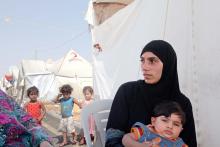
I wish I could sit beside you on a cushion on the floor and have a cup of tea with you. I would like to snuggle your baby in my arms. I would like to hear your story. I know you have a sad story, and if I heard it, I would weep.
I know you are good and loving women. I’m sorry you have lost so much. I’m sorry you had to come to a country, a city, and a house that is not yours.
I can imagine you in your own country, strong women serving others. I can imagine you making beautiful food and sharing it with your family and friends. I can imagine you caring for your mothers and daughters, fathers and sons, sisters and brothers and friends. Just the way I do.
Because that’s what women do. We are compassionate. We give. We serve. We protect. We work hard to make the world better for the people we love.
Wherever I go in the world, I discover that we women are very much alike. We may have different clothes. Different languages. Different cultures. Maybe our skin is a different color. But in our hearts, we are the same.
That’s why we can look into each other’s eyes and feel connected. We can talk without using words. We can smile. We can hug. We can laugh.
And sometimes, we can feel each other’s pain. I have prayed that God would help me feel your pain. I wish I could remove your pain. I wish I could help you carry it.
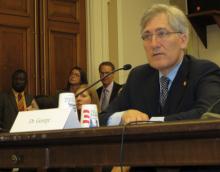
One of the nation’s leading — and official — champions of religious freedom implored the Obama administration to add Pakistan and Syria to the list of nations that most egregiously violate religious rights.
Before a congressional subcommittee on Thursday Robert P. George, chairman of the U.S. Commission on International Religious Freedom, said it makes little sense that the roster compiled by the U.S. has barely changed in a decade.
The congressionally chartered commission George heads recently advocated that the State Department add eight nations to the eight already designated as “countries of particular concern.” But among the recommended additions, he singled out Pakistan and Syria for their deteriorating and troublesome records on religious liberty.